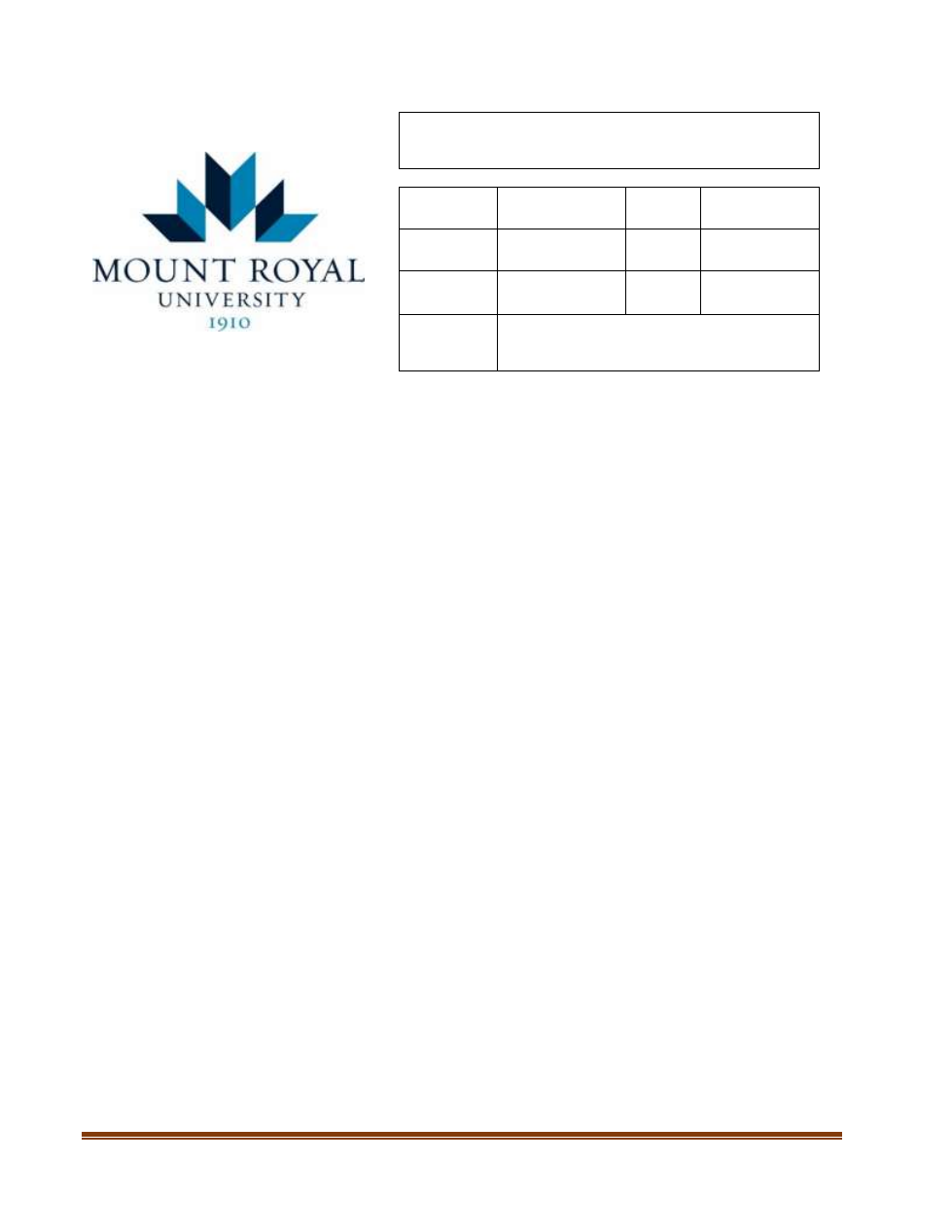
Academic Accommodation for Students Experiencing Disabilities Procedures – March 25, 2014
Page 1 of 17
ACADEMIC ACCOMMODATION FOR STUDENTS
EXPERIENCING DISABILITIES PROCEDURES
Procedure
Type:
Management
Initially
Approved:
December 11,
2006
Procedure
Sponsor:
Vice-President,
Students
Last
Revised:
March 25, 2014
Administrative
Responsibility:
AVP, Student
Experience and
Success
Review
Scheduled:
September 2025
Approver:
Executive Leadership Team
A.
PROCEDURES
1.
GUIDELINES FOR STUDENTS REQUIRING ACADEMIC ACCOMMODATION
1.1
Registration with Access and Inclusion Services
Students are advised to register with Access and Inclusion Services as early as
possible to avoid a delay in service. New students should contact Access and Inclusion
Services upon admission. Students should contact Access and Inclusion Services
each semester to review their needs and their current personal information.
1.2
Requesting Academic Accommodation
Students requesting Academic Accommodation(s) will meet with an Access Advisor to
identify their specific needs. This includes providing relevant, and if requested,
corroborated, current medical, psycho-educational or psychological documentation to
Access and Inclusion Services. Documentation of the Disability(ies) must be:
a.
From a physician, psychologist, audiologist, ophthalmologist or other licenses
specialist;
b.
Submitted on letterhead and include the clinician's name, title, phone number,
address, date(s) of assessment; and
c.
Dated.
In addition, the documentation must indicate the impact the Disability(ies)/condition(s)
has on the student in an academic setting. It may identify or recommend specific
Accommodations and supports that would reduce the Barriers encountered in an
educational setting.
1.3
It is the student's responsibility to ensure that sufficient notice, as defined by Access
and Inclusion Services' procedures, is given to enable Mount Royal to make the
necessary Accommodation(s).
1.4
In situations where the requested Academic Accommodation is beyond the authority
of Access and Inclusion Services (e.g. University-level modification such as priority
registration access), Access and Inclusion Services will provide appropriate and

Academic Accommodation for Students Experiencing Disabilities Procedures – March 25, 2014
Page 2 of 17
relevant recommendations, information and/or facilitation related to the
Accommodation process to students and University personnel.
1.5
Work with Access and Inclusion Services to develop an Accommodation plan (the
Accommodation Agreement).
1.6
If applicable, students should apply for funding for academic accommodation as
identified by the Access Advisor.
1.7
Provide the Professor Acknowledgement form and Academic Accommodation Memo
to relevant faculty/instructional staff. Faculty/instructional staff should provide an
opportunity outside of the classroom environment to discuss academic
accommodation requirements in a private and confidential setting.
1.7
Students should notify Career Services or the relevant department personnel in
advance of a work term placement, clinical, internship or practicum if a specific
Accommodation is required for the work placement, as these Accommodations may
require additional time to coordinate. Career Services or the relevant department
personnel will work in consultation with the employer, the Faculty/School and Access
Services, where appropriate, to support suitable Accommodations.
2.
GUIDELINES FOR FACULTY/INSTRUCTIONAL STAFF
2.1
Communicate to students at the beginning of the semester their willingness to meet
with Students Experiencing Disabilities who require Accommodation to discuss their
Accommodation requirements. Instructors shall include a statement in their syllabus
indicating their willingness to assist in the provision of Academic Accommodations,
informing students of the role of Access and Inclusion Services and the University’s
responsibility to provide necessary Academic Accommodation.
2.2
Receive the Professor Acknowledgement form and Academic Accommodation Memo
from the student. Students shall be provided with an opportunity to discuss their
Accommodation(s) with faculty/instructional staff in a private and confidential setting.
2.3
Understand that Access and Inclusion Services cannot disclose medical information to
faculty/instructional staff, including the details of an individual student’s diagnosis.
These restrictions are imposed by legislation. Only information relevant and essential
to the Academic Accommodation process, such as the impact or functional limitations
of a Disability or condition, can be disclosed to relevant personnel on a need-to-know
basis.
2.4
Concerns or disagreements related to recommended or directed Accommodations
should be discussed with the relevant Access Advisor.
2.5
Where an Accommodation decision has been made by the appropriate delegated
authority, that decision shall be upheld until the appeal process has been exhausted.
The student’s Accommodation shall not be disrupted during an appeal process. If an
appeal is upheld, the appropriate authority (Executive Director, Student Affairs or
Dean/Director) shall determine the most appropriate way to remedy the situation, in
consultation with the relevant faculty/instructional staff, Access Advisor and any other
appropriate individual(s).
2.6
Faculty/instructional staff are not delegated authority to deny an Academic
Accommodation unless it is a course-level Substitution or Waiver.
(See “Authority for Academic Accommodation Decisions”).

Academic Accommodation for Students Experiencing Disabilities Procedures – March 25, 2014
Page 3 of 17
2.7
Where faculty/instructional staff are delegated authority for Academic Accommodation
decisions (course-level Substitutions and Waivers), they must make their decision
based on the criteria set out below. A request for an Academic Accommodation shall
not be denied without first consulting the appropriate University personnel, including
the Diversity and Human Rights Advisor and/or University Legal Counsel to ensure
Mount Royal is upholding its statutory obligations.
3.
GUIDELINES FOR PROGRAM/DEPARTMENT CHAIRS, DEANS/DIRECTORS AND OTHER
UNIVERSITY PERSONNEL WITH ACADEMIC ACCOMMODATION
AUTHORITY
3.1
Receive recommendations or referrals from Access and Inclusion Services.
3.2
Understand that Access and Inclusion Services can not disclose medical information
to University personnel, including the details of an individual student’s diagnosis.
These restrictions are imposed by legislation. Only information relevant and essential
to the Academic Accommodation process and decision, such as the impact or
functional limitations of a Disability or condition, can be disclosed to relevant personnel
on a need-to-know basis.
3.3
Concerns or disagreements related to recommended Accommodations should be
discussed with Access and Inclusion Services.
3.4
Academic Accommodation decisions shall be based on the criteria set out in these
procedures. A request for an Academic Accommodation shall not be denied without
first consulting the appropriate University personnel, including the Diversity and Human
Rights Advisor and/or University Legal Services to ensure Mount Royal is upholding
its statutory obligations.
4.
AUTHORITY FOR ACADEMIC ACCOMMODATION DECISIONS
4.1
Authority for Academic Accommodation decisions is determined based on both the
type (Modification, Substitution, Waiver, Degree Notwithstanding a Deficiency) and
Level (Course, Program or University) of Accommodation being sought and is vested
in the individual(s) with the most appropriate expertise for the situation.
4.2
In all cases, Academic Accommodation decisions will be made in a timely fashion, in
consultation with Access and Inclusion Services and based on documented Bona Fide
Educational Requirements. Those with decision-making authority will fully apprise
themselves of the relevant information, involving individuals who are knowledgeable
about accessibility, Academic Accommodation and Human Rights issues. A request
for Academic Accommodation shall not be denied without first consulting with the
appropriate University personnel, including the Diversity and Human Rights Advisor
and/or University Legal Services to ensure Mount Royal is upholding its statutory
obligations. Reasonable Accommodation can only be denied by the University for
reasons of Undue Hardship.
4.3
All decision-makers will uphold the University’s responsibility to maintain confidentiality
and privacy.
4.4
Modifications
a.
The authority to grant a Modification at the Course-Level and Program- Level
is delegated to Access and Inclusion Services after reasonable consultation
with appropriate academic authorities, taking into account both academic
concerns and legal obligations.

Academic Accommodation for Students Experiencing Disabilities Procedures – March 25, 2014
Page 4 of 17
b.
The authority to grant a Modification at the University-Level is delegated to the
Executive Director, Student Affairs based on recommendations from Access
and Inclusion Services.
4.5
Substitutions
a.
The authority to grant Substitutions at the Course-Level is delegated to the
course instructor.
(b)
The authority to grant Substitutions at the Program-Level is delegated to the
program or department Chair.
(c)
The authority to grant Substitutions at the University-Level rests with General
Faculties Council.
4.6
Waivers
The authority to grant Waivers is delegated in the same manner as Substitutions,
recognizing that Waivers cannot be made of Bona Fide Educational Requirements.
4.7
Degree Notwithstanding a Deficiency
The authority to grant a Degree Notwithstanding a Deficiency rests with General
Faculties Council. Normally, the General Faculties Council would exercise this
authority upon a recommendation from a Faculty/School.
5.
APPEALS OF ACADEMIC ACCOMMODATION DECISIONS
5.1
All parties to an appeal of an academic accommodation decision shall have access to
support, including from their respective Associations (i.e., Students’ Association of
Mount Royal University, Mount Royal Faculty Association, Mount Royal Staff
Association).
5.2
Academic Accommodation decisions shall be upheld until the appeal process has been
exhausted. The student's Accommodation shall not be disrupted during the appeal
process. If an appeal is upheld, the appropriate authority (Director, Access and
Inclusion Services or Dean/Director) shall determine the most appropriate way to
remedy the situation, in consultation with the relevant faculty/instructional staff, Access
Advisor and any other appropriate individual(s).
5.3
Only those individuals with a real and substantial connection to the Academic
Accommodation decision have grounds to appeal that decision.
5.4
While students are encouraged to be active participants in the Accommodation
process, there are circumstances that may limit a student’s ability to self-advocate.
Factors such as the inherent power differential in the instructor-student relationship,
the pervasive stigma involved with requiring Academic Accommodation, as well as the
very nature of some Disabilities, can all play a role in a student’s ability to play an active
role in the Accommodation process.
5.5
Failure to provide Reasonable Accommodation where required by law amounts to
Discrimination. Students who believe they have not been Reasonably Accommodated
and have exhausted the appeal process may bring their concerns to Diversity and
Human Rights Services.

Academic Accommodation for Students Experiencing Disabilities Procedures – March 25, 2014
Page 5 of 17
5.7
Individuals requesting Accommodation retain their right to consult, or file a complaint
with, the Alberta Human Rights Commission at any time. A complaint must be made
to the Commission within one year after the alleged incident of Discrimination.
5.8
Appeal Process Step 1
Informal discussion with the initial decision-maker. Depending on the type and level of
Accommodation sought, this may be an Access Advisor, Course Instructor,
Program/Department Chair or Executive Director, Student Affairs.
5.9
Appeal Process Step 2
a.
In the case of Access and Inclusion Services as initial decision-maker (Course-
Level and Program-Level):
i.
Students may appeal the decision of the Access Advisor in writing to
the Director of Access and Inclusion Services within five (5) business
days:
o The Director of Access and Inclusion Services will fully inform
him/herself of the circumstances and conduct a timely review,
involving individuals who are knowledgeable about accessibility,
Academic Accommodation, Human Rights issues and the
particular issues being adjudicated, including the Faculty/School
Accessibility Advisory Committee.
o The Director of Access and Inclusion Services shall not refuse an
Accommodation until after consulting with the Vice-President,
Students (or designate) and University Legal Services. Under
Human Rights legislation, Reasonable Accommodation can only
be denied by the University for reasons of Undue Hardship.
o The Director of Access and Inclusion Services’ decision will be
rendered in a timely fashion, normally within ten (10) business
days.
o The decision of the Director of Access and Inclusion Services is
final.
ii.)
Other individuals directly and substantially connected to the Academic
Accommodation decision (e.g., course instructor) may appeal the
decision of the Access Advisor in writing to the appropriate
Dean/Director within five (5) business days of the initial decision.
o The Dean/Director may sub-delegate his/her decision-making
authority to the Associate Dean level.
o Deans/Directors will fully inform themselves of the circumstances
and conduct a timely review, involving individuals who are
knowledgeable about accessibility, Academic Accommodation,
Human Rights issues and the particular issues being adjudicated,
including the Faculty/School Accessibility Advisory Committee.
o The Dean/Director shall not refuse an Accommodation until after
consulting with the Provost and Vice-President, Academic or
designate and University Legal Services. Under Human Rights

Academic Accommodation for Students Experiencing Disabilities Procedures – March 25, 2014
Page 6 of 17
legislation, Reasonable Accommodation can only be denied by
the University for reasons of Undue Hardship.
o The Dean’s/Director’s decision will be rendered in a timely
fashion, normally within (twenty) 20 business days.
o The decision of the Dean/Director is final.
b.
In the case of Course Instructor (Course-Level Substitutions or Waivers) or
Program/Department Chair (Program-Level Substitutions or Waivers) as initial
decision-maker:
i.
Individuals directly and substantially connected to the Academic
Accommodation decision (e.g., student requesting Accommodation,
course instructor) may appeal the decision of the course instructor or
Program/Department Chair in writing to the appropriate Dean/Director
(or the Provost and Vice-
President, Academic in cases where the Dean/Director is the deciding course
instructor) within five (5) business days of the initial decision.
o The Dean/Director may sub-delegate his/her decision-making
authority to the Associate Dean level.
o The Dean/Director will fully inform him/herself of the
circumstances and conduct a timely review, involving individuals
who are knowledgeable about accessibility, Academic
Accommodation, Human Rights issues and the particular issues
being adjudicated, including the Faculty/School Accessibility
Advisory Committee.
o The Dean/Director shall not refuse an Accommodation until after
consulting with the Provost and Vice-President, Academic (or
designate) and University Legal Services. Under human rights
legislation, Reasonable Accommodation can only be denied by
the University for reasons of Undue Hardship.
o The decision of the Dean/Director is final.
B.
DEFINITIONS
(1)
Academic
Accommodation(s):
Academic Accommodation refers to the process of
making alteration(s) to the delivery of academic services
and requirements, including admission, progression and
graduation requirements, to enable equitable
participation. The Academic Accommodation of Students
Experiencing Disabilities involves activities like making
adjustments or alternative arrangements in the
educational environment to ensure it does not have a
discriminatory effect on a student because of the
Disabilities they may experience.
Modification is an Accommodation involving a relatively
minor change made to an academic admission,
progression or graduation requirement. Modifications
usually involve a revision to the way a student must

Academic Accommodation for Students Experiencing Disabilities Procedures – March 25, 2014
Page 7 of 17
demonstrate required skills and knowledge, or
sometimes additional assistance for a student which does
not detract from the skills and knowledge the student
must acquire. See Appendix 2 for examples.
Substitution is an Accommodation involving the
replacement of a certain academic admission,
progression or graduation requirement by another that is
deemed comparable. Substitutions are commonly used
to effect Accommodations. See Appendix 2 for
examples.
Waiver is an Accommodation involving the removal of an
academic criterion for admission, progression or
graduation. A Waiver should never be offered in regard to
a Bona Fide Educational Requirement. A Waiver does not
include a case where a requirement is replaced by
another requirement (this is a Substitution), but rather is
the complete elimination of a non-Bona Fide Educational
Requirement. See Appendix 2 for examples.
Degree Notwithstanding a Deficiency is one that is
conferred upon a student who has not met all the General
Faculties Council-approved requirements for their
program of study and for whom no other Accommodation
has been approved in regard to the missing requirements.
A degree not-withstanding a deficiency, when approved
by General Faculties Council (or the Dean, as delegated
in the Academic Standing, Continuance and Graduation
policy) is the only way in which a student may effectively
obtain a Waiver of what would otherwise be considered a
Bona Fide Educational Requirement.
(2)
Access Advisor:
refers to a qualified Access and Inclusion Services
professional who works with students, faculty/
instructional staff and other University personnel to
develop appropriate Accommodations, or
recommendations for Accommodations for Students
Experiencing Disabilities.
(3)
Access and Inclusion
Services:
refers to the Mount Royal department with delegated
authority to assist the University in discharging its legal
and moral duty to provide Academic Accommodation and
to create an accessible learning environment that
encourages full participation in academic courses for
Students Experiencing Disabilities. Access and Inclusion
Services works with students, faculty/instructional staff
and other University personnel to develop appropriate
Accommodations for students who experience
Disabilities in the post-secondary environment.
(4)
Accommodation
Agreement:
refers to the signed arrangement, facilitated by Access
and Inclusion Services, made between Mount Royal and
the student that:

Academic Accommodation for Students Experiencing Disabilities Procedures – March 25, 2014
Page 8 of 17
a.
specifies the recommended Accommodation(s) to
be provided by Mount Royal for the student; and,
b.
authorizes the release of information to appropriate
individuals when necessary.
(5)
Barrier:
is a structure, design, practice and/or criterion that
prevents or impedes a person from accessing a facility or
service.
(6)
Bona Fide Educational
Requirement(s):
are those requirements that are a reasonable and
justifiable component of a program that may limit entry to,
or completion of, a program or course. In the context of
Academic Accommodation, they include the admission,
progression and graduation requirements that are
essential to maintain the academic integrity of a program,
including those necessary for students to acquire and
demonstrate essential skills and knowledge.
(7)
Course-Level
Accommodation(s):
refer to Accommodations generally related to Course-
specific admission or progression criteria. Examples
include methods of course delivery and evaluation or
course prerequisites.
(8)
Disability:
is an umbrella term, covering impairments, activity
limitations and participation restrictions. Disability is thus
not just a health problem. It is a complex phenomenon,
reflecting the interaction between features of a person’s
body and features of the society in which they live.
Overcoming the obstacles faced by people experiencing
Disabilities requires interventions to remove
environmental and social Barriers.
(9)
Discrimination:
is defined as one or a series of unwanted behaviours or
communication directed toward an individual or members
of an identifiable group be-cause of a prohibited ground
of Discrimination, as identified by the Act and reflected in
the Mount Royal Human Rights policy. The prohibited
grounds of Discrimination are:
Race
Ancestry
Religious Belief
Physical Disability
Age
Marital Status
Family Status
Colour
Place of Origin
Gender
Mental Disability
Sexual Orientation
Source of Income
Gender Identity and Expression

Academic Accommodation for Students Experiencing Disabilities Procedures – March 25, 2014
Page 9 of 17
Discrimination is behaviour which may be rooted in a
prejudicial attitude. Discrimination is an act of
differentiated treatment towards an individual as a
member of a group or towards a group, which can
disadvantage an individual or group.
Discrimination often excludes an individual from a right or
privilege to which they would otherwise be entitled.
Whether it is colleague to colleague, supervisor to
subordinate, subordinate to supervisor, employee to
student, student to employee, or student to student,
Discrimination introduces a disruptive element into Mount
Royal's environment which endangers the well-being and
job performance or educational experience of the
individual.
(10) Duty to Accommodate:
refers to the obligation of an employer or service provider
to take measures to eliminate for employees, prospective
employees or clients disadvantages that result from a
rule, practice or physical Barrier that has or may have an
adverse impact on individuals or groups protected under
the Act. Mount Royal has the Duty to Accommodate to
the point of Undue Hardship. In the Mount Royal context,
the University is both an employer and a service provider
and clients mean any student or other member of the
community wishing to make use of our services or
facilities. The Duty to Accommodate recognizes that true
equality means respecting individual’s different needs.
(11) Human Rights:
are inalienable, indivisible, universal entitlements codified
in international and domestic law. In Canada, they are
protected through:
The Canadian Charter of Rights and Freedoms;
Provincial/territorial human rights legislation (e.g., Alberta
Human Rights Act);
Decisions of tribunals and courts;
Human rights commission policy statements,
interventions and other mandated functions; and,
International law/instruments (ratified treaties, treaty body
comments/decisions, international and other jurisdictional
decisions).
(12) Professor
Acknowledgement:
refers to the signed form that verifies the course instructor
has received the student’s confidential Academic
Accommodation Memo and to acknowledge that the
student has met with the course instructor to discuss how
the Accommodation request may relate to the design of
the course.

Academic Accommodation for Students Experiencing Disabilities Procedures – March 25, 2014
Page 10 of 17
(13) Program-Level
Accommodation(s):
refer to Accommodations normally related to program-
specific admission, progression or graduation criteria.
Examples include clinical or practica requirements.
(14) Policy:
means the Academic Accommodation for Students
Experiencing Disabilities Policy
(15) Reasonable
Accommodation:
refers to an Accommodation that addresses an inequity
without creating an Undue Hardship on the employer or
service provider. The law requires that Students
Experiencing Disabilities must be provided Reasonable
Accommodation, not perfect accommodation.
(16) Students Experiencing
Disabilities:
refers to those individuals who have any verifiable and
persistent physical, learning, cognitive, sensory,
psychological, neurological, or temporary impairment that
may affect their academic progress.
(17) Systemic Discrimination:
(also referred to as Substantive or Institutional
Discrimination) can be described as a pattern of
behaviour, policies or practices that are part of an
organization, and which create or perpetuate
disadvantage related to one or more of the prohibited
grounds set out in the Act. In many cases, systemically
Discriminatory policies and practices seem neutral on
their face but when applied equally to all result in
differential treatment to a particular group.
(18) Undue Hardship:
refers to unreasonable and excessive challenges for the
institution which may include but are not limited to:
a. The financial cost of the Accommodation(s) will hurt
the viability of the institution; and/or
b. There are significant competing rights; and/or
c.
There are health and safety concerns; and/or
d. The Accommodation would compromise Bona Fide
Educational or Occupational Requirements.
Undue Hardship is determined by a three-part test
created by the Supreme Court of Canada and interpreted
by tribunals and courts. According to the Alberta Human
Rights Commission, the Undue Hardship standard is very
high and post-secondary institutions will normally be
required to provide Accommodation. Individuals may
consult with Diversity and Human Rights Services and/or
the University's Legal Services with their questions
regarding Undue Hardship and Mount Royal’s legal Duty
to Accommodate.
(19) University:
means Mount Royal University
(20) Universal Access/
Universal Design:
is an approach to the design of all products, processes,
procedures, systems, structures and environments. The

Academic Accommodation for Students Experiencing Disabilities Procedures – March 25, 2014
Page 11 of 17
goal is to make these as useable as possible by as many
individuals as possible, regardless of ability. "Universal"
does not imply one solution for everyone; rather, it reflects
an awareness of the unique nature of each individual as
well as the need to accommodate differences. The aim is
to create learning and working experiences to suit the
individual and to maximize the individual's ability to
progress.
(21) University-Level
Accommodation(s):
refer to Accommodations related to general admission,
progression or graduation requirements and related to
processes administered by a central University authority.
Examples include graduation requirements like General
Education courses or processes such as access to
registration.
C.
RELATED POLICIES
•
Academic Accommodation for Students Experiencing Disabilities Policy
•
Academic Standing, Continuance and Graduation Policy
•
Code of Student Community Standards Policy
•
Human Rights Policy
•
Universal Access Policy
D.
RELATED LEGISLATION
•
Alberta Human Rights Act.
•
Alberta Freedom of Information and Protection of Privacy Act.
•
Alberta Health Information Act.
•
Canadian Charter of Rights and Freedoms.
E.
RELATED DOCUMENTS
•
Academic Accommodation Memo
•
Code of Student Community Standards Procedure
•
Collective Agreement between the Board of Governors of Mount Royal University and the Mount
Royal Faculty Association
•
Collective Agreement between the Board of Governors of Mount Royal University and the Mount
Royal Staff Association
•
Human Rights Procedures
•
Professor Acknowledgement Form
•
United Nations Standard Rules on Equalization of Opportunities for Persons with Disabilities
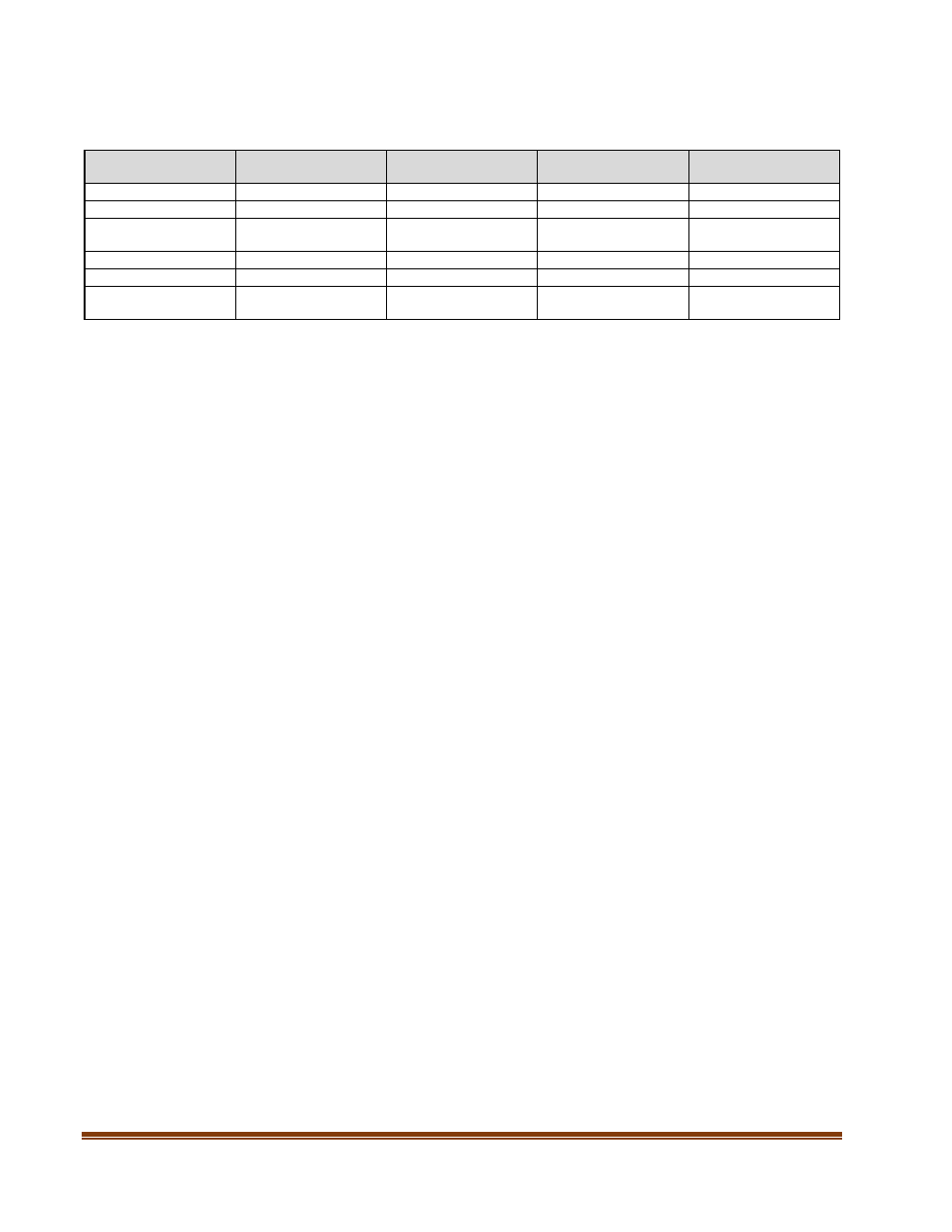
Academic Accommodation for Students Experiencing Disabilities Procedures – March 25, 2014
Page 12 of 17
F.
REVISION HISTORY
Date
(mm/dd/yyyy)
Description of
Change
Sections
Author
(Position Title)
Approver
(Position Title)
12/11/2006
NEW
03/25/2014
08/18/2017
Editorial – formatting
Director, University
Secretariat
Director, University
Secretariat
02/11/2021
Editorial
Title Updates
University Secretary
University Secretary
06/10/2021
Editorial
Title/name changes
University Secretary
University Secretary
12/09/2022
Editorial
Job titles, Related
Policies
Policy Advisor
University Secretary
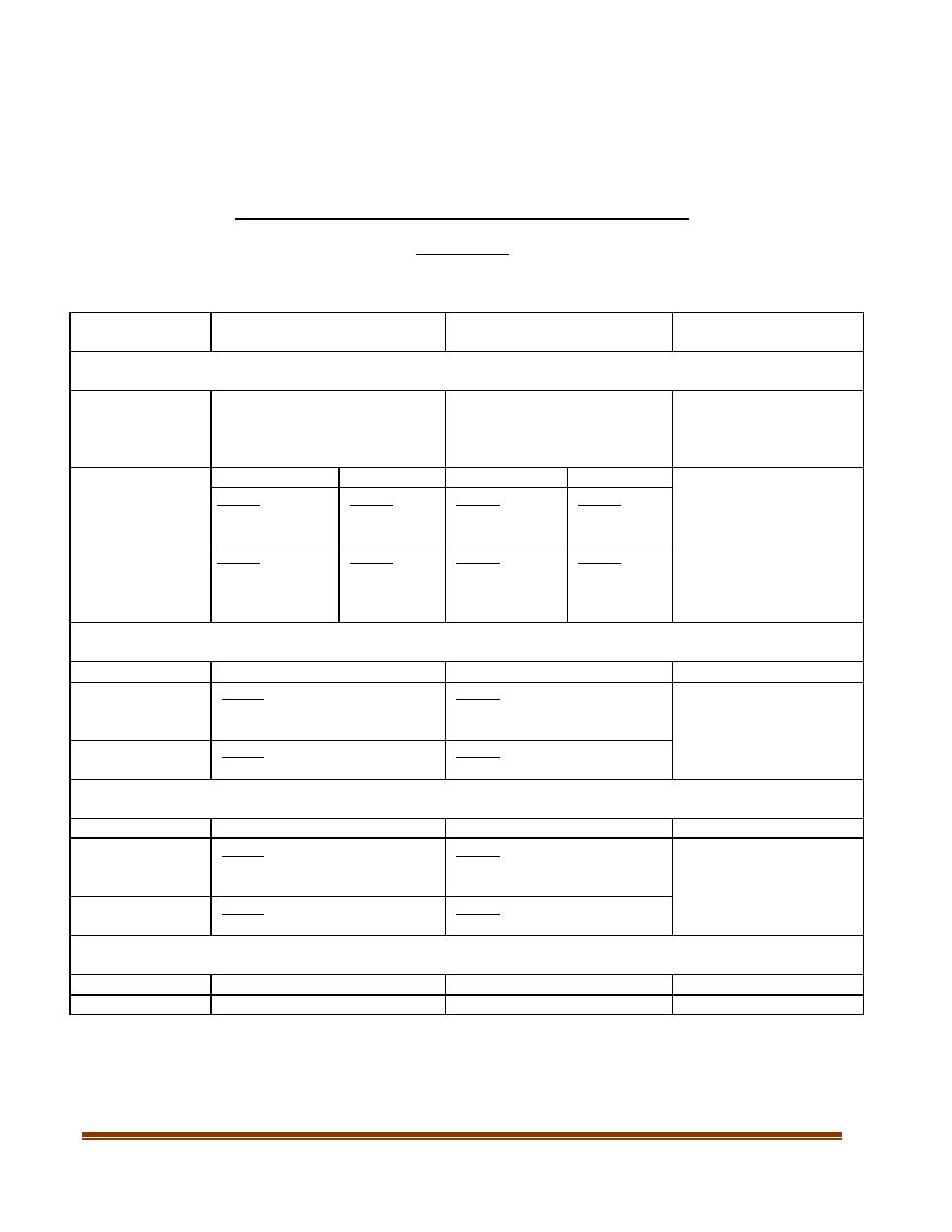
Academic Accommodation for Students Experiencing Disabilities Procedures – March 25, 2014
Page 13 of 17
MOUNT ROYAL UNIVERSITY
ACADEMIC ACCOMMODATION FOR STUDENTS EXPERIENCING DISABILITIES POLICY
AUTHORITY FOR ACADEMIC ACCOMMODATION DECISIONS
APPENDIX 1
COURSE LEVEL
PROGRAM LEVEL
UNIVERSITY LEVEL
MODIFICATION
AUTHORITY
Access and Inclusion Services in
consultation with Faculty
Access and Inclusion Services in
consultation with
Department/Program Chair
AV
-P Enrolment
Management, upon
recommendation of Access
and Inclusion Services
APPEAL
* Only those with a
real
and substantial
connection to the
decision have
grounds to appeal
Student
Other
Student
Other
Discuss with AV
-P,
Enrolment Management.
Decision is final.
Step 1: Access
Advisor (informal)
Step 1: Access
Advisor
(informal)
Step 1: Access
Advisor
(informal)
Step 1: Access
Advisor
(informal)
Step 2: Director,
Access and
Inclusion Services
(Formal)
Step 2:
Dean/Director
(Formal)
Step 2: Director,
Access and
Inclusion
Services (Formal)
Step 2:
Dean/Director
(Formal)
SUBSTITUTION
AUTHORITY
Course Instructor
Program/Department Chair
General Faculties Council
APPEAL
Step 1: Discussion with decision-
maker (informal)
Step 1: Discussion with decision-
maker (informal)
The decision of GFC is final.
Step 2: Dean/Director (Formal)
Step 2: Dean/Director (Formal)
WAIVER
AUTHORITY
Course Instructor
Program/Department Chair
General Faculties Council
APPEAL
Step 1: Discussion with decision-
maker (informal)
Step 1: Discussion with decision-
maker (informal)
The decision of GFC is final.
Step 2: Dean/Director (Formal)
Step 2: Dean/Director (Formal)
DEGREE NOTWITHSTANDING A DEFICIENCY
AUTHORITY
N/A
N/A
General Faculties Council
APPEAL
N/A
N/A
General Faculties Council

Academic Accommodation for Students Experiencing Disabilities Procedures – March 25, 2014
Page 14 of 17
MOUNT ROYAL UNIVERSITY
ACADEMIC ACCOMMODATION FOR STUDENTS EXPERIENCING DISABILITIES POLICY
EXAMPLES OF ACADEMIC ACCOMMODATIONS BY TYPE AND LEVEL
APPENDIX 2
COURSE-LEVEL
PROGRAM-LEVEL
UNIVERSITY-LEVEL
MODIFICATION
A relatively minor change to
academic requirement,
usually revision to way
student demonstrates
required skill/knowledge or
additional assistance.
Additional time for exams
Alternate exam format
Provision of note taker or
interpreter
Alternate modes of course
delivery or evaluation
Use of adaptive technology or
special equipment
Use of adaptive technology or
special equipment
Modifications to clinical/
practical requirements
Priority registration access
Full-time equivalency status
SUBSTITUTION
Replacement of academic
requirement by another
deemed comparable.
Replace course pre-requisite
with similar course
Replace clinical/practical
requirement with written
assignment
Substitute clinical/practical
requirement with previous
work/volunteer experience
Replace General Education
requirement or elective with
similar course
WAIVER
Removal of academic
requirement; should never be
offered in regard to Bona Fide
Educational Requirement.
Exempt student from
completing an assignment or
exam
Waive course pre-requisite
Waive program admission
criteria without equivalent
replacement
Waive credit required to
graduate
Waive requirement Grade 12
course
Waive General Education or
elective requirement
Waive requirement for at least
60% in required Grade 12
courses
DEGREE
NOTWITHSTANDING A
DEFICIENCY
Credential conferred upon
student who hasn't met all
requirements for program;
only way to effectively obtain
waiver of Bona Fide
Educational Requirement
.
N/A
N/A
Waive a Bona Fide
Educational Requirement
Normally granted on
compassionate grounds, such
as a degree granted
posthumously or the
correction of a historical
wrong beyond the control of
the student
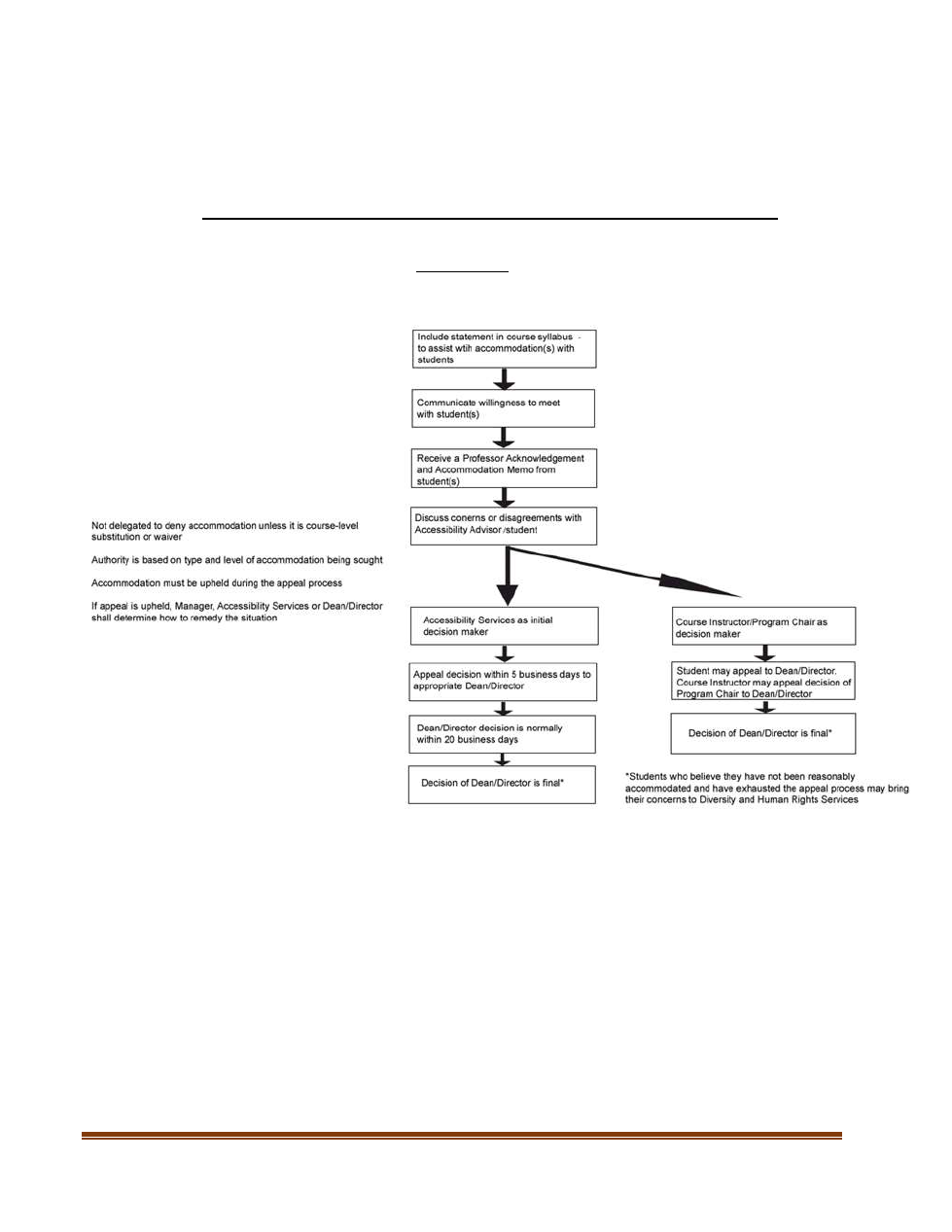
Academic Accommodation for Students Experiencing Disabilities Procedures – March 25, 2014
Page 15 of 17
MOUNT ROYAL UNIVERSITY
ACADEMIC ACCOMMODATION FOR STUDENTS EXPERIENCING DISABILITIES POLICY
FACULTY/INSTRUCTIONAL STAFF RECEIVING ACCOMMODATION REQUEST
APPENDIX 3
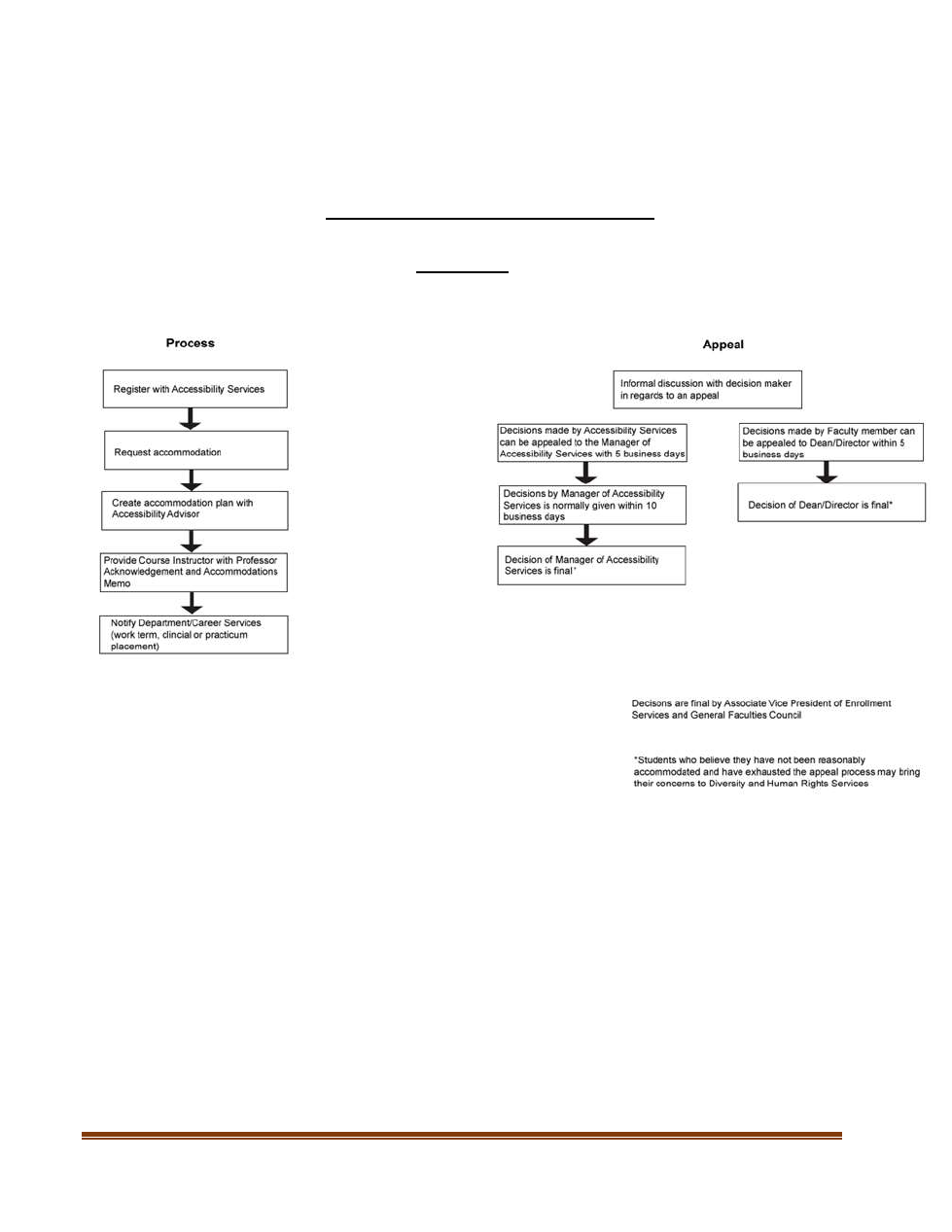
Academic Accommodation for Students Experiencing Disabilities Procedures – March 25, 2014
Page 16 of 17
MOUNT ROYAL UNIVERSITY
ACADEMIC ACCOMMODATION FOR STUDENTS EXPERIENCING DISABILITIES POLICY
STUDENT REQUESTING ACCOMMODATION
APPENDIX 4

Academic Accommodation for Students Experiencing Disabilities Procedures – March 25, 2014
Page 17 of 17
MOUNT ROYAL UNIVERSITY
ACADEMIC ACCOMMODATION FOR STUDENTS EXPERIENCING DISABILITIES POLICY
SAMPLE OF A COURSE SYLLABUS STATEMENT
APPENDIX 5
If you are a student with an Academic Accommodation Memo and Professor Acknowledgement
form from Access and Inclusion Services, please make an appointment with me as soon as
possible to discuss your Accommodations in a private and confidential setting. Requests to
review and sign Academic Accommodation documents should not be made during or between
classes.
If you are a Student Experiencing a Disability who may require Academic Accommodation and
have not yet registered with Access and Inclusion Services, please contact their office at 403-
440-6868. You must be registered with Access and Inclusion Services to access Academic
Accommodations.
If you require Academic Accommodations for a reason other than Disability, please make an
appointment with me to discuss or contact Diversity and Human Rights Services at 403-440-
5956.
















